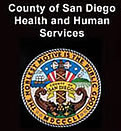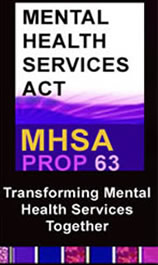MENTAL HEALTH SERVICES ACT • MHSA • PROP 63 |
|||||
Every child
... It is easy for parents to identify their child’s physical needs: nutritious food, warm clothes when it’s cold, and bedtime at a reasonable hour. However, a child’s mental and emotional needs may not be as obvious. Parents and family members are usually the first to notice if a child has problems with emotions or behavior. The parent’s observations with those of teachers and other caregivers may lead you to seek help for their child. The basics for a child’s good mental health are: • Unconditional love from family, Self-confidence and high self-esteem, Family responsiveness is key in infant and toddler social development. Good mental health allows children to think clearly, develop socially and keep From birth to school age, children are totally dependent on their parents and caregivers than at any other time in their lives. Children must be provided with physical sustenance as well as social, emotional and intellectual stimulation. Maternal bonding and attachment and maternal responsiveness to newborn/infant cues are predictors to later cognitive ability and mental health in school aged children and adolescents. Since children develop rapidly, delivering mental health services and supports early and swiftly is necessary to avoid permanent consequences and to ensure that children are ready for school. The environment which optimizes healthy early childhood must be loving, and nurturing. During the 0 to 7 formative years, we lay the foundations for trust, form "attachments" and "feelings of self-worth". Although not all children need exactly the same from the world around them, all, without doubt, thrive best in physically and emotionally healthy surroundings. The negative consequences of neglect during this age cannot be overstated. Examples of the high-risk populations among infants and mothers are teen parents, families living in poverty, and parents abusing drugs and/or alcohol. We cannot emphasize enough the opportunities for long term positive outcomes in committing mental health services and resources to working with this age group. The 7 to 11 year-old age group is extremely important to the well being of communities. During this stage all children emerge from the circle of family influence and gradually become part of the wider social fabric. This is the age when children actively explore the values and norms of their community. The success of the transition of children in our community into the wider world has a tremendous impact on their future life opportunities. Legally, children of this age group who are in crisis are not considered responsible for their own actions. For effective community safety and crime prevention, early identification and early intervention are key considerations for this age group. Research has shown that public money spent on education and the protection and provision of basic necessities have the greatest impact on these individuals' futures. Children aged seven to eleven are also most easily influenced by education and social/community interventions.
|
|||||
Transforming Mental Health Services Together |
|||||
Salud+HealthInfo is for information and educational purposes only. You should not rely on this information as a substitute for personal medical attention, diagnosis or hands-on treatment. If you are concerned abut your health or that of a child, please consult your family's physician or health provider immediately and do not try to diagnose yourself. Salud+Health Info is published and distributed free of charge by Info Option Network (ION) Publishing Company. Copyright © 2001-2008 Info Option Network |
|||||
Bienvenido a la primer revista dedicada al cuidado de la salud
 info
info
The first, the best & the only English & Spanish Magazine in San Diego, California
|




 learning new and necessary skills to succeed in his/her life.
learning new and necessary skills to succeed in his/her life. 